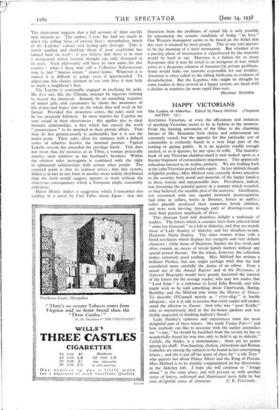HAPPY VICTORIANS
The Ladies of Alderley. Edited by Nancy Mitford. (Chapman and Hall. xis.)
ANYTHING Victorian, or even the affectation and imitation of anything Victorian, seems to be in fashion at the moment. From the dashing unveracity of the films to the charming fancies of Mr. Housman both choice and achievement are extremely varied, but the appetite for this particular sort of commodity is evidently found in a very large part of the reading or gazing public. It is an appetite readily enough excited, or so it appears, by any spice or trifle. The laundry- book of any Victorian chamber-maid is now looked upon as a literary fragment of extraordinary importance. This apparently ridiculous interest is, in reality, pathetic. We are looking back at the calm Victorian period with regret. In her skittish though delightful preface, Miss Mitford very correctly draws attention to the security, both moral and material, of the happy families in those remote and unrepeatable days. Providence, indeed, was favouring the grateful gentry in a manner which revealed, so they believed, the sensible Om of the universe. Gentlemen, not concerned with any squalid monetary preoccupation, had wine in cellars, books in libraries, horses in stables ; ladies placidly produced their numerous lovely children, and were seen moving, through park or drawing-room, in their final gracious amplitude of dress.
This pleasant book will doubtless delight a multitude of readers. The letters which it contains have been selected from " some ten thousand " in a loft at Alderley, and they are mainly those of Lady Stanley of Alderley and her daughter-in-law, Henrietta Maria Stanley. The older woman writes with a florid resolution which displays her energetic and very definite character ; while those of Henrietta Stanley are less vivid, and often contain an excess of trivial family matters without any special period flavour. On the whole, however, the collection makes extremely good reading. Miss Mitford has written a brilliant Preface, but one might perhaps wish that she had considered more carefully the duties of an editor. Even a casual use of the Annual Register and of the Dictionary of National Biography would have greatly increased the interest of the letters for the average reader, who may not realise that " Lord John " is a reference to Lord John Russell, and who might wish to be told something about Clanricarde, Baring, Boothby, and the Mitford who wrote the History of Greece. To describe O'Connell merely as " 1775-1847 " is hardly adequate ; nor is it safe to assume that every reader will under- stand the allusion to Zanoni. And who was " poor Koelle," who so mysteriously died in the ice-house gardens and was darkly suspected of drinking bullock's blood ?
Lady Stanley's opinions and experiences form the most delightful part of these letters. She reads Vanity Fair—" and how anybody can like to associate with the author astonishes me "—nay, " he should be banished from the society he has so wonderfully found -his way into only to hold it up to ridicule." Carlyle, she thinks, is a monomaniac ; there are no grains among his chaff. Fox-hunting, cholera, chloroform and Roman Catholics are among the subjects to be found in her entertaining letters ; and she is put off her game of chess by " a vile Tory " who quizzes her about Prince Albert and the King of Prussia. Miss Mitford is to be warmly congratulated on her discoveries in the Alderley loft. I hope she will continue to " forage about " in the same place, and will present us with another series of letters, enlivened and illuminated more fully by her own delightful sense of character. C. E. VULLIAMY.














































 Previous page
Previous page